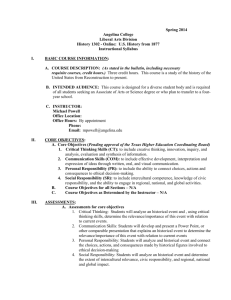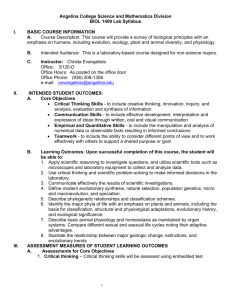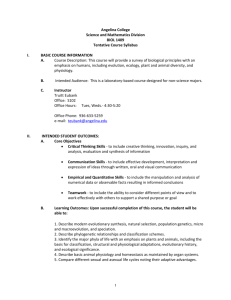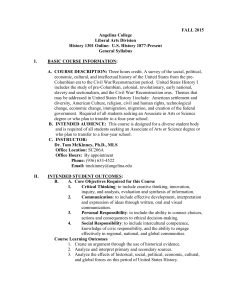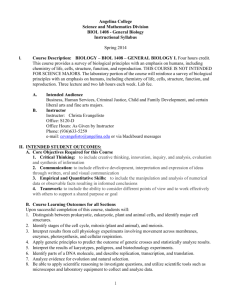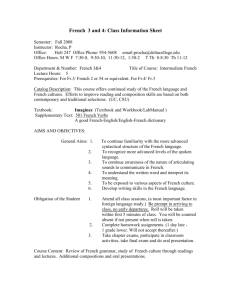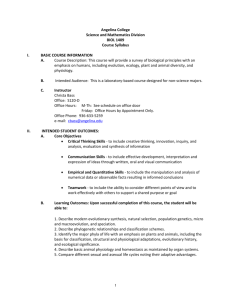Syllabus - Angelina College
advertisement
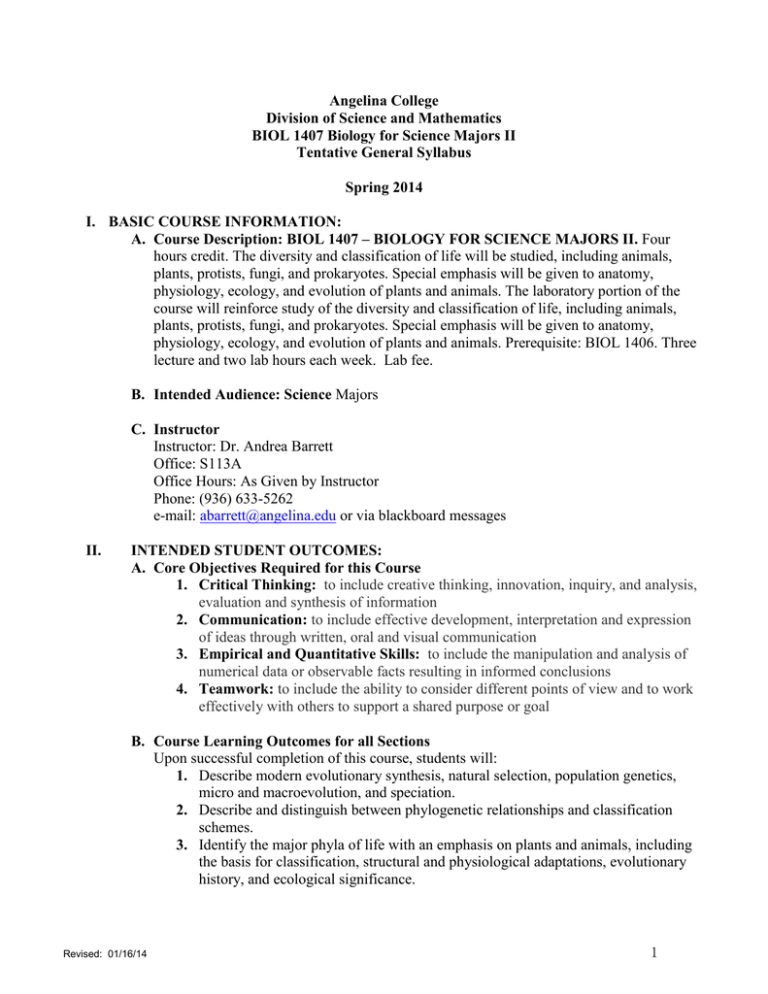
Angelina College Division of Science and Mathematics BIOL 1407 Biology for Science Majors II Tentative General Syllabus Spring 2014 I. BASIC COURSE INFORMATION: A. Course Description: BIOL 1407 – BIOLOGY FOR SCIENCE MAJORS II. Four hours credit. The diversity and classification of life will be studied, including animals, plants, protists, fungi, and prokaryotes. Special emphasis will be given to anatomy, physiology, ecology, and evolution of plants and animals. The laboratory portion of the course will reinforce study of the diversity and classification of life, including animals, plants, protists, fungi, and prokaryotes. Special emphasis will be given to anatomy, physiology, ecology, and evolution of plants and animals. Prerequisite: BIOL 1406. Three lecture and two lab hours each week. Lab fee. B. Intended Audience: Science Majors C. Instructor Instructor: Dr. Andrea Barrett Office: S113A Office Hours: As Given by Instructor Phone: (936) 633-5262 e-mail: abarrett@angelina.edu or via blackboard messages II. INTENDED STUDENT OUTCOMES: A. Core Objectives Required for this Course 1. Critical Thinking: to include creative thinking, innovation, inquiry, and analysis, evaluation and synthesis of information 2. Communication: to include effective development, interpretation and expression of ideas through written, oral and visual communication 3. Empirical and Quantitative Skills: to include the manipulation and analysis of numerical data or observable facts resulting in informed conclusions 4. Teamwork: to include the ability to consider different points of view and to work effectively with others to support a shared purpose or goal B. Course Learning Outcomes for all Sections Upon successful completion of this course, students will: 1. Describe modern evolutionary synthesis, natural selection, population genetics, micro and macroevolution, and speciation. 2. Describe and distinguish between phylogenetic relationships and classification schemes. 3. Identify the major phyla of life with an emphasis on plants and animals, including the basis for classification, structural and physiological adaptations, evolutionary history, and ecological significance. Revised: 01/16/14 1 4. Describe basic animal physiology and homeostasis as maintained by organ systems. 5. Compare different sexual and asexual life cycles noting their adaptive advantages. 6. Illustrate the relationship between major geologic change, extinctions, and evolutionary trends. 7. Apply scientific reasoning to investigate questions, and utilize scientific tools such as microscopes and laboratory equipment to collect and analyze data. 8. Use critical thinking and scientific problem-solving to make informed decisions in the laboratory. 9. Communicate effectively the results of scientific investigations III. ASSESSMENT MEASURES A. Assessments for the Core Objectives: 1. Critical thinking – Students will analyze, compare, and contrast published scientific reports. Their findings will be presented to the class in the form of an oral presentation. A written synopsis will be submitted to the instructor. Evidence of critical analysis will be assessed using a standardized rubric. 2. Communication – Oral and visual communication will be assessed during the class presentation of the findings from the critical analysis of scientific literature. Written communication will be assessed based on the synopsis of findings as well as documentation used in the presentation. Communication skills and abilities will be assessed using a standardized rubric. 3. Empirical and Quantitative Skills – In comparing the assigned scientific literature, students will compare and analyze the data presented in the articles. Their findings will be presented orally and in written format. Empirical and quantitative skills will be evaluated using a standardized rubric. 4. Teamwork – Students will be assigned to teams. Each team will be assigned specific scientific literature to analyze and compare. Team members will work together to define the roles of each member, will collaborate to share information and generate a meaningful synopsis of the compared works. Team members will evaluate the performance of one another using standardized rubrics. B. Assessments for Course Learning Outcomes 1. Describe modern evolutionary synthesis, natural selection, population genetics, micro and macroevolution, and speciation. 2. Describe and distinguish between phylogenetic relationships and classification schemes. 3. Identify the major phyla of life with an emphasis on plants and animals, including the basis for classification, structural and physiological adaptations, evolutionary history, and ecological significance. 4. Describe basic animal physiology and homeostasis as maintained by organ systems. 5. Compare different sexual and asexual life cycles noting their adaptive advantages. 6. Illustrate the relationship between major geologic change, extinctions, and evolutionary trends. 7. Apply scientific reasoning to investigate questions, and utilize scientific tools such as microscopes and laboratory equipment to collect and analyze data. 8. Use critical thinking and scientific problem-solving to make informed decisions in Revised: 01/16/14 2 IV. V. the laboratory. 9. Communicate effectively the results of scientific investigations. INSTRUCTIONAL PROCEDURES: A. This course is taught using a combination of lecture, online activities, and laboratory exercises. COURSE REQUIREMENTS AND POLICIES: A. Required Textbooks and Recommended Readings, Materials and Equipment. 1. Biology: How Life Works by Morris, Hartl, Knoll, Lue. 1st Edition. 2. Biology 1407 Laboratory Manual (Available in AC bookstore) 3. Access to Blackboard (www.angelina.blackboard.com) 4. Access to http://www.whfreeman.com/launchpad/morris1e/372107 5. Scantron for all exams B. Course Policies – This course conforms to the policies of Angelina College as stated in the Angelina College Handbook. 1. Academic Assistance – If you have a disability (as cited in Section 504 of the Rehabilitation Act of 1973 or Title II of the Americans with Disabilities Act of 1990) that may affect your participation in this class, you should see Karen Bowser, Room 208 of the Student Center. At a post-secondary institution, you must selfidentify as a person with a disability; Ms. Bowser will assist you with the necessary information to do so. To report any complaints of discrimination related to disability, you should contact Dr. Patricia McKenzie, Administration Building, Room 105 or 936-633-5201. 2. Attendance – Attendance is required as per Angelina College Policy and will be recorded every day. Any student with three (3) consecutive absences of four (4) cumulative absences may be dropped from the class. Records will be turned in to the academic dean at the end of the semester. Do not assume that non-attendance in class will always result in an instructor drop. You must officially drop a class or risk receiving an F. This is official Angelina College Policy. 3. Additional Policies Established by the Instructor Be prepared to begin class on time and do not prepare to leave before class is over. No eating or drinking is allowed in class. Cell phones should be turned off during class time. Children and other guests are not permitted in the classroom. Children are not allowed to wait in the hall unsupervised. See Student Services for child-care problems. Students are expected to participate in the instruction through courteous, relevant comments and questions during class. Behavior that interferes with the learning environment will not be tolerated. Conferences outside of class are available by appointment during the instructor’s posted office hours. ATTENDANCE: To be considered present for a class period, the student must be present when roll is taken. STUDENT CONDUCT: A positive environment for learning will be maintained by students being courteous to each other and to the instructor. Revised: 01/16/14 3 VI. Eating, drinking, sleeping, and distracting conversations during lecture will not be allowed. Cheating on tests is not tolerated as per Angelina College policy and may result in expulsion from the course. EVALUATION AND GRADING: A. Grades will be the calculated from points earned in the lecture and the laboratory. There will a total of 700 possible points in the lecture and 500 total possible points in the laboratory. Grades for the course will be based upon the following guidelines (points from lecture + lab): Total Points 1080 – 1200 960 – 1079 840 – 959 720 – 839 Below 720 Grade A B C D F 1. Lecture Exams: There will be four regular non-comprehensive lecture exams that will be given as shown on the class schedule. The final exam is comprehensive and will be given during the scheduled final examination period. Each exam is worth 100 points. 2. Missed exams: There will be NO make-up exams. The final exam grade may replace the single lowest test grade or the grade for a missed exam. 3. Lecture Homework: Homework assignments will be given throughout the semester via http://www.whfreeman.com/launchpad/morris1e . Collectively, they are worth a possible 100 points. 4. Problem Sets: There will be five problems sets assigned throughout the semester. The problem sets will be given be posted on Blackboard one week before each due date, as shown on the lecture schedule. Collectively, they are worth a possible 100 points. 5. Lab Exams: There will be three regular non-comprehensive lecture exams that will be given as shown on the class schedule. Each exam is worth 100 points. 6. Lab Reports: There will be post lab data and questions due after each experiment. Collectively, they are worth a possible 200 points. SYLLABUS MODIFICATION: The instructor may modify the provisions of the schedule to meet individual class needs by informing the class in advance as to the changes being made. Revised: 01/16/14 4 VII. Month Jan Feb Mar Apr May COURSE OUTLINE: Description of the Course Activities including due dates, schedules, and deadlines. Day M W M Date 20 22 W M W M W M W M W M W 29 3 5 10 12 17 19 24 26 3 5 10-14 17 19 24 26 31 2 7 9 14 16 21 23 28 M W M W M W M W M W M W M W M W W 27 30 5 7 14 Description MLK Holiday Evolution: How Genotypes and Phenotypes change over Time Species and Speciation Evolutionary Patterns: Phylogeny and Fossils Human Origins and Evolution Eukaryotic Cells: Origins and Diversity Being Multicellular Bacteria and Archaea Exam 1 Fungi: Structure, Function, and Diversity Plant Structure and Function: Moving Photosynthesis onto Land Plant Reproduction: Finding Mates and Dispersing Young Plant Growth and Development: Building the Plant Body Plant Defence: Keeping the World Green Plant Diversity Spring Break Exam 2 Animal Nervous System Animal Sensory Systems and Brain Function Animal Movement: Muscles and Skeletons Animal Endocrine Systems Animal Cardiovascular and Respiratory Systems Animal Metabolism, Nutrition, and Digestion Animal Renal System: Water and Waste Exam 3 Animal Reproduction and Development Animal Immune Systems Animal Diversity Animal Behavior Population Ecology Species Interactions, Communities, and Ecosystems Exam 4 Review Final Exam Comprehensive Final Exam (8:00-10:00am) Chapter 21 22 23 24 27 28 26 (PS1) Exam 1 34 29 30 31 32 33 (PS2) Holiday Exam 2 35 36 37 38 39 (PS3) 40 41 Exam 3 42 43 (PS4) 44 45 46 47 (PS5) Exam 4 Review SCHEDULE MODIFICATION: The instructor may modify the provisions of the schedule to meet individual class needs by informing the class in advance as to the changes being made. Revised: 01/16/14 5 Revised: 01/16/14 6
